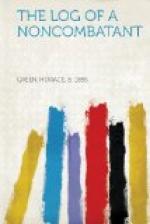“The captain is not here. We go to the commissaire at headquarters,” said the polite politzei. It was then that we cut loose, told him to bring the commissaire or the burgomaster to us, and started to walk off. It was a bad move. So far he had handled us with a velvet grip, but at the first sign of insurrection he showed his teeth, locked arms with each of us, and, signaling another officer to follow, forthwith marched us off to police headquarters and our ultimate resting-place, the guardroom cell.
How long we stayed there I don’t know—long enough, at all events, to get a glimpse of the Dutch police system and the third degree as practiced in the Lowlands. There swung open a great iron door leading to the street and the market-place, not so large but fully as busy as Washington Market the week before Thanksgiving. Through it, sobbing and screaming, their hats gone and their hair torn, came two women, roughly handled by gendarmes and followed by a mob escort. They were thrown weeping and expostulating into an adjoining cell. A gendarme came out with trickles of blood on his face. He mopped his brow and complained of feminine finger-nails. Close behind him followed a male friend of the imprisoned women. He pleaded with the sergeant at the desk, while the moans of the women, under pressure to confess their crime, came from their cell. But Jack Rose only scratched and scratched monotonously, and now and then gazed at the middle of the speaker’s stomach.
In the mean time we fell back into our habit of talking for publication. With an intimacy that would have surprised those gentlemen we referred casually to Brand Whitlock, Dr. van Dyke, and the biggest Dutch and Belgian names we could think of. We suspected that Jack Rose and the man at our side understood more English than they pretended. At all events, it had its effect. In half an hour we were taken before the commissioner.
Two cigars lay on the edge of the table nearest us. I could see at a glance that we were free.
“Do you speak English?” I asked him.
“No,” he answered in our native tongue; “only French, Flemish, German, and Italian—but not English.” And with a grin he asked for our passports.
“You are for the American newspapers?”
“Yes,” I answered—“one of us is a lawyer who writes occasionally. I am correspondent for a New York and a Boston paper, but I won’t cable anything from here.” For this reason, I explained, no movements of troops or news of military value could leak out.
“Ah, I see,” said the commissioner who could not talk English. “An amateur correspondent and a slow correspondent. But correspondents are not at all tolerated in this province. It is five o’clock. You will board the train leaving this province at 5.16 P.M.”




